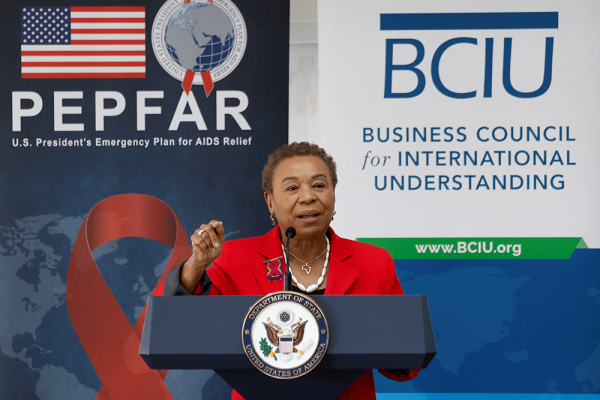Over the past two decades, the United States has saved millions of lives by investing $110 billion in the U.S. President’s Emergency Plan for AIDS Relief, which aims to end the AIDS crisis by 2030. More than 25 million lives have been saved since PEPFAR launched in 2003, and 5.5 million babies who would have been born with HIV were born virus-free.
The initiative has been “world-changing,” Hally Mahler, HIV director for FHI 360, a global health and development nonprofit, told Sojourners. Mahler has been working on the response to the AIDS crisis since 1993, including 10 years working in Tanzania, and saw firsthand the difference it made when the U.S. took a leadership role in what had become a global health crisis. “The people of the United States should be proud,” she said.
But that program’s future is in jeopardy, largely thanks to right-wing abortion politics. Earlier this year, Republican lawmakers stalled the program’s customary five-year reauthorization — which had passed under every president since its creation.
The five-year reauthorization has been opposed by Susan B. Anthony Pro-Life America and The Heritage Foundation’s action arm, Heritage Action, according to Christianity Today reporting. Both organizations, along with the Family Research Council, would downgrade the pro-life score of any legislator who voted for the 5-year authorization, according to CT.
Instead, House Republicans and conservative organizations are pushing for a one-year authorization and a reinstatement of the Protecting Life In Global Health Assistance rules, known as the “Mexico City Policy.” The policy has been in place under every Republican since President Ronald Reagan’s administration and reversed by every Democratic administration. The rule prevents nonprofits and nongovernmental organizations receiving PEPFAR funds from promoting or educating on abortion, even if those organizations use separate funds to do so. Such rules currently apply to other foreign aid sources, but PEPFAR had long been exempt.
There is no evidence that PEPFAR funds have been used to promote abortion. PEPFAR supports “sexual reproductive health,” which refers to “prevention of mother to child transmission of HIV and access to condoms; 2) education, testing and treatment for sexually transmitted infections; 3) cervical cancer screening and care; and 4) gender-based violence prevention and care,” according to the Biden administration.
The House passed a one year extension of PEPFAR, but Senate Democrats and Republicans agree it will not pass the Senate. Moving from a five-year cycle to a one-year cycle will inhibit the work programs can do, Mahler said. “You can’t plan a world-changing initiative and fight for funding every year.”
Federal law already stipulates that U.S. foreign aid may not be used for abortions. The U.S. Agency for International Development’s partners broadly and swiftly denied allegations that PEPFAR funding was used to promote abortions.
“PEPFAR has never, will not ever, use that platform in supporting abortion,” said U.S. Global AIDS Coordinator John Nkengasong in June, according to Devex.
Representative Barbara Lee (D-Calif.), one of the original co-sponsors of the legislation that created PEPFAR in 2003, has continued to champion the program during the rocky lead up to its reauthorization. She told Sojourners that failure to reauthorize the program would be “devastating for millions.”
“As one of the original authors, I am committed to working with my Republican colleagues to turn aside extremist efforts to derail PEPFAR, pass a clean, five-year extension of this life-saving program, and achieve the first AIDS-free generation by 2030,” she said in an email. “We have a moral imperative to get this done and keep saving lives.”
Mahler, who has been working with PEPFAR-funded initiatives since its inception, said the abortion rules have always been in place, and organizations like hers have a role in ensuring that the provisions put in place by Congress flow down to providers in partnering countries — be those global nonprofits, local clinics, or other humanitarian groups. She was comfortable being definitive: “We don’t provide services related to abortion with PEPFAR funding.”
The United States Conference of Catholic Bishops, which does not agree with every use of PEPFAR funding (some funded initiatives support the use of condoms, which the Catholic Church does not support) issued statements expressing their strong support for the goals and work of PEPFAR.
“We write to affirm PEPFAR’s extraordinary life-saving work to date, and to express our strong, ongoing support for its goals and hope for its robust continuation,” the council wrote in June when rumblings about PEPFAR’s future began. However, the USCCB did urge Congress to place PEPFAR again under the Mexico City Policy, though their support for PEPFAR was not contingent on it.
While the Heritage Foundation and Republicans in Congress claim that the Biden administration was “hijacking” PEPFAR for a pro-abortion agenda, experts on the ground point out that in most countries where the funds go, abortion is illegal. In her decades of work, Mahler has not seen PEPFAR funds being used to “free up” other funds that could then be used on abortion-related services.
What people don’t often realize, Mahler said, is that the infrastructure created and maintained by PEPFAR and the U.S. Agency for International Development initiatives it funds were also critical in the response to another global health crisis: COVID-19. The infrastructure for health education, medication distribution, testing, working with governments, therapeutic responses, and personnel deployment was in place. EPiC, the program Mahler administrates at FHI 360, was modified to respond to COVID-19, delivering oxygen and vaccines, she said. “We’re not the only ones.”
Forming global partnerships to do lifesaving work in the face of viruses that cross political boundaries and borders without discrimination “fits really well with U.S. diplomatic goals,” Mahler said.
In addition to being international, the impact has been generational. As AIDS-related deaths peaked in the early 2000s, the United Nations was predicting that as many as half of the teenagers in the hardest hit countries of southern Africa would likely die of AIDS. PEPFAR has been credited as a major reason the number of AIDS related deaths have gone down so dramatically — 69 percent lower in 2022 since the peak in 2004, according to the news and research outlet KFF.
“As one of our local partners in Zambia said to me recently, before PEPFAR, everyone in his community had lost friends and family to HIV and AIDS, and today, everyone knows someone who is being kept alive by PEPFAR’s lifesaving work,” said Meghan Topp Goodwin, senior policy and legislative specialist for Catholic Relief Services. “That is a truly astonishing impact, and it’s why PEPFAR is considered by many to be the most successful global health program in history and a model of U.S. leadership to the world.”
Got something to say about what you're reading? We value your feedback!






